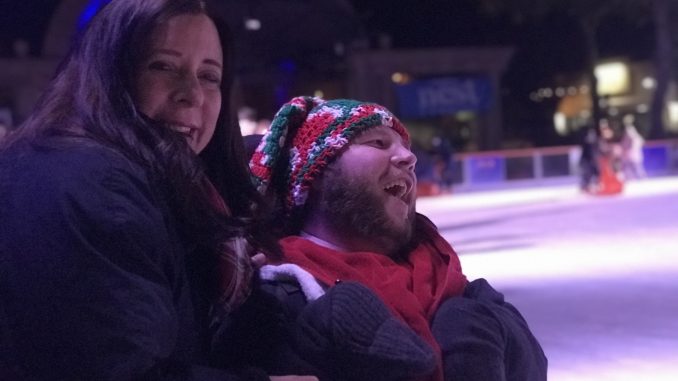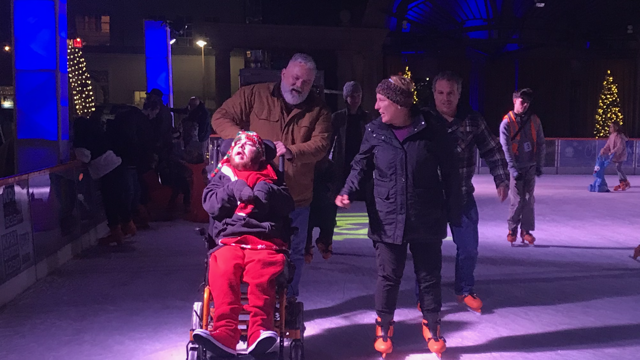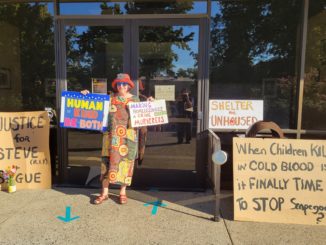
The chilly night air, sharpened by the frozen surface beneath his wheels, did nothing to cool the warmth of Kevin Hines’ smile as he first circled the ice rink in Chico City Plaza Thursday night (Dec. 9). His journey onto the ice, a simple thing for most people, was days’ long and fraught with the type of disappointment he’s unfortunately become accustomed to in his 24 years.
Hines, as his mother Lisa Gunn explained Wednesday (Dec. 8), has cerebral palsy, resulting in physical and intellectual disabilities. He uses a wheelchair and requires assistance for most activities, which is provided by Gunn and a handful of trusted caregivers.
Hines and one of those caregivers first visited the rink on Dec. 5 and were told by two employees that he was not allowed on the ice in his wheelchair. This happened despite the rink’s website saying that wheelchairs could be accommodated. After confirming the details with Hines’ caregiver, Gunn did something else that’s all too familiar to her family: She stood up to advocate for him.
A Facebook post Gunn wrote the same evening Hines was turned away quickly garnered more than 100 sympathetic comments and 30 shares—and someone put her in touch with the rink’s general manager, Downtown Chico Business Association employee Mason Penstein. Hines was invited back to the rink and onto the ice for free, with some other perks. Gunn accepted the offer, though said it doesn’t quite make up for the situation happening in the first place.
“I appreciate that effort,” Gunn said, “but why does it always have to be, ‘We’re sorry, we’ll do better next time’?” It needs to be a priority, especially if you claim it’s your policy. It might not come up often, but turning even one person away because of a wheelchair is unfortunate.”
Furthermore, though both Penstein and the CEO of the rink’s vendor expressed concern for Hines’ situation, neither could identify, nor took responsibility for, how the mistake occurred.
Missed information or misinformation?
The rules cited in Gunn’s Facbook post, which she copied and pasted from the rink’s DCBA website, are as follows:
“Is the Ice-Skating Rink wheelchair accessible? Wheelchairs are welcome on the ice but admission for skating must be paid.
“Powered or non-powered wheelchairs may go on the ice if they can be safely operated.
“Guests in non-powered wheelchairs that cannot operate their wheelchair safely need to be accompanied by an aide who will be able to walk on the ice in rubber-cleated spike’s (provided free of charge). There is no charge for the attendant pushing the wheelchair.”
Those rules have been altered slightly on the site since Dec. 5. They now emphasize differences between powered and non-powered chairs, reading, “We are working with our vendor to determine whether we may also allow ELECTRIC wheelchairs on the ice.”
Interviewed separately Thursday, both Penstein and Ice-America CEO Scott Williams said Hines was turned away because he was in a motorized wheelchair. Gunn said this not the case; the chair he was turned away in is the same one he was allowed on the ice with during his second visit.
“I was given different information than that,” Penstein said, explaining he wasn’t present at the time. “It sounded like the staff was misinformed.”
When asked how rink employees are trained and informed of policies and practices, Williams said a representative of Ice-America visits each new rink to host an approximately four-hour orientation. He said accessibility and accommodation issues are definitely part of that training.
Penstein said he “doesn’t recall” that part of the training: “Ice-America did the orientation, so I’m not exactly sure if that was covered, but to my knowledge it wasn’t covered to the extent it needs to be because that poor gentleman in question wasn’t able to join us on the ice that day.”
In defense of his company’s practices, Williams said, “We’ve never said in training that the answer is no; it’s in our plans and training. … I’m not sure where the disconnect was, and I’m sorry there was, but I don’t know what happened.
“We go to very large efforts to make sure we can accommodate everyone,” he added.

A constant fight
Overall, Penstein chalked the incident up to the learning curve involved in running an ice rink, something new to Chico.
“We never expected an issue to begin with,” he said. “We didn’t see it as a problem or anything really to be concerned about. This is our first year attempting the ice rink, so these are questions that we’re really just coming to find as they arise.”
And therein, Gunn said, lies the core issue—people with special needs are too often excluded from activities others take for granted.
“I understand that people don’t [consider the difficulties],” she said. “Before I had a child in a wheelchair, I didn’t understand the struggles of accessibility; you just don’t think about it. But now, after 24 years of trying to access things for my son in a wheelchair, it is a struggle, and it’s something I will always talk to people about how they can do better.
“It’s just really disappointing, because things like that have happened numerous times in his life. And it’s always, ‘Sorry, we’ll do better,’ and, ‘Gosh, we didn’t think about that.’”
Gunn said even trips downtown, where the ice rink is located, are rare for them. There’s a dearth of disabled parking spaces in the area, and even those that are available on the street can’t accommodate wheelchair ramps. The way the plaza is fenced off for the rink further exacerbates the parking problem. She said many businesses, and particularly those downtown, may technically meet guidelines established by the federal Americans with Disabilities Act—the 1990 law aimed at providing better access and accommodations for people with disabilities—but only minimally so. She added that, more than 30 years after this law was established, it remains woefully disregarded and unenforced.
When Hines visited the rink his second time, the management provided a rink-side warming tent for him, his friends and family. About a dozen of them came out to skate with him and share in his small victory. Gunn quipped she’d hurt herself and stayed off the ice, but she watched with pride as one of his caregivers, Jim Secola—wearing cleated shoes—pushed him around the rink.
Though thrilled to see her son get his wish, she also repeated some misgivings. She said the rink’s management contacted her a second time to say it might be better for Hines to come to the rink early, when crowds were thin, rather than the 6 p.m. time they’d already agreed upon. She declined.
“I think it’s a good learning opportunity for their staff to have someone in a wheelchair here when it’s busy,” she said. “I don’t go looking for trouble and don’t like to cause problems for anyone, and I’m not looking for free stuff. But I will always fight for my son and do what I can to educate people about these challenges.”




Well written wonderful article. Needs to be seen by everyone. Okay to post links and quote the article.? Most compelling piece!!!!!